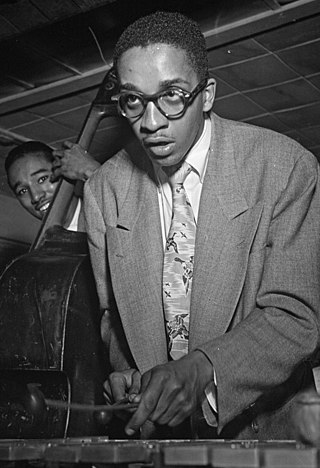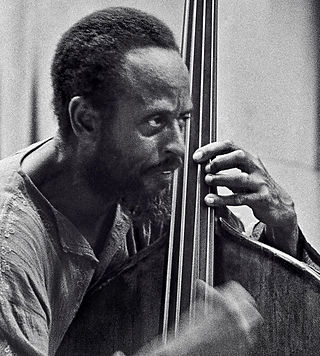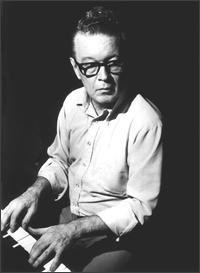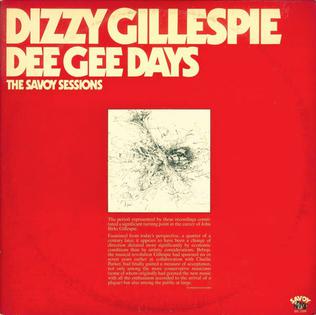Related Research Articles

Bebop or bop is a style of jazz developed in the early to mid-1940s in the United States. The style features compositions characterized by a fast tempo, complex chord progressions with rapid chord changes and numerous changes of key, instrumental virtuosity, and improvisation based on a combination of harmonic structure, the use of scales and occasional references to the melody.

John Birks "Dizzy" Gillespie was an American jazz trumpeter, bandleader, composer, educator and singer. He was a trumpet virtuoso and improviser, building on the virtuosic style of Roy Eldridge but adding layers of harmonic and rhythmic complexity previously unheard in jazz. His combination of musicianship, showmanship, and wit made him a leading popularizer of the new music called bebop. His beret and horn-rimmed spectacles, scat singing, bent horn, pouched cheeks, and light-hearted personality have made him an enduring icon.

Milton Jackson, nicknamed "Bags", was an American jazz vibraphonist. He is especially remembered for his cool swinging solos as a member of the Modern Jazz Quartet and his penchant for collaborating with hard bop and post-bop players.

Cool jazz is a style of modern jazz music inspired by bebop and big band that arose in the United States after World War II. It is characterized by relaxed tempos and a lighter tone than that used in the fast and complex bebop style. Cool jazz often employs formal arrangements and incorporates elements of classical music. Broadly, the genre refers to a number of post-war jazz styles employing a more subdued approach than that of contemporaneous jazz idioms. As Paul Tanner, Maurice Gerow, and David Megill suggest, "the tonal sonorities of these conservative players could be compared to pastel colors, while the solos of [Dizzy] Gillespie and his followers could be compared to fiery red colors."

Theodore "Fats" Navarro was an American jazz trumpet player and a pioneer of the bebop style of jazz improvisation in the 1940s. A native of Key West, Florida, he toured with big bands before achieving fame as a bebop trumpeter in New York. Following a series of studio sessions with leading bebop figures including Tadd Dameron, Bud Powell, and Kenny Clarke, he became ill with tuberculosis and died at the age of 26. Despite the short duration of his career, he had a strong stylistic influence on trumpet players who rose to fame in later decades, including Clifford Brown and Lee Morgan.

Eli "Lucky" Thompson was an American jazz tenor and soprano saxophonist whose playing combined elements of swing and bebop. Although John Coltrane usually receives the most credit for bringing the soprano saxophone out of obsolescence in the early 1960s, Thompson embraced the instrument earlier than Coltrane.

Kenneth Clarke Spearman, known professionally as Kenny Clarke and nicknamed Klook, was an American jazz drummer and bandleader. A major innovator of the bebop style of drumming, he pioneered the use of the ride cymbal to keep time rather than the hi-hat, along with the use of the bass drum for irregular accents.

Percy Heath was an American jazz bassist, brother of saxophonist Jimmy Heath and drummer Albert Heath, with whom he formed the Heath Brothers in 1975. Heath played with the Modern Jazz Quartet throughout their long history and also worked with Miles Davis, Dizzy Gillespie, Charlie Parker, Wes Montgomery, Thelonious Monk and Lee Konitz.

Alan Warren Haig was an American jazz pianist, best known as one of the pioneers of bebop.

George Wallington was an American jazz pianist and composer. Born in Sicily, his career as a pianist began in the early 1940s, when he played with Dizzy Gillespie and Charlie Parker and contributed to the development of bebop. Following several years as a sideman during the late 1940s, he formed his own group, experimenting with trios and a string ensemble before settling upon a permanent quintet.

Hezekiah Leroy Gordon Smith, better known as Stuff Smith, was an American jazz violinist. He is well known for the song "If You're a Viper".
Joe "Bebop" Carroll was an American jazz vocalist who worked with Dizzy Gillespie between 1949 and 1953. His collaborations with Gillespie include the humorous songs "Swing Low, Sweet Cadillac" and "Oo Bla Dee."

Albert J. "Budd" Johnson III was an American jazz saxophonist and clarinetist who worked extensively with, among others, Ben Webster, Benny Goodman, Big Joe Turner, Coleman Hawkins, Dizzy Gillespie, Duke Ellington, Quincy Jones, Count Basie, Billie Holiday and, especially, Earl Hines.

This is a list of recordings by American jazz alto saxophonist Charlie Parker ("Bird"). Parker primarily recorded for three labels: Savoy, Dial, and Verve. His work with these labels has been chronicled in box sets. Charlie Parker's Savoy and Dial Sessions have been issued on The Complete Savoy Sessions, Charlie Parker on Dial and Complete Charlie Parker on Dial and The Complete Savoy & Dial Master Takes. His Verve recordings are available on Bird: The Complete Charlie Parker on Verve and The Complete Verve Master Takes.
Matthew Gee was an American bebop trombonist.

Ernie Henry was an American jazz saxophonist.

The Modern Jazz Sextet is a jazz album featuring the combined talents of Dizzy Gillespie, Sonny Stitt, John Lewis, Percy Heath, Skeeter Best and Charlie Persip. The album was conceived by producer Norman Granz for his own label, Norgran Records. Although no single album artist is credited as a bandleader for this album, Verve Records - which owns the Norgran catalogue - files it as a Dizzy Gillespie album.

Dee Gee Days: The Savoy Sessions is a compilation album by trumpeter Dizzy Gillespie featuring performances recorded in 1951 and 1952 and originally released on Gillespie's own Dee Gee Records label. Many of the tracks were first released as 78 rpm records but were later released on albums including School Days (Regent) and The Champ (Savoy).

The Curtis Fuller Jazztet is an album by American trombonist Curtis Fuller with saxophonist Benny Golson, recorded in 1959 and released on the Savoy label.
References
- ↑ Kennedy, Gary (2002). Barry Kernfeld (ed.). The New Grove Dictionary of Jazz, vol. 1 (2nd ed.). New York: Grove's Dictionaries Inc. p. 590. ISBN 1561592846.
- ↑ "Gillespie Sets Up Dee Gee Disk Org", The Billboard, April 14, 1951, pg. 18
- ↑ Dizzy Gillespie, with Al Fraser, To Be, or Not...to Bop. New York, Doubleday 1979, p. 370
- ↑ Dee Gee Records Discography Both Sides Now Publications: Dee Gee Records Discography
- ↑ Nadine Cahodas, Spinning Blues into Gold: The Chess Brothers and the Legendary Chess Records. New York, St. Martin's Griffin, 2000
- ↑ Broadway World Review of Dave Usher's book "Music is Forever: Dizzy Gillespie, the Jazz Legend, and Me"
- ↑ Dizzy Gillespie Discography JazzDisco.org
- ↑ Lars Bjorn with Jim Gallert, Before Motown: A History of Jazz in Detroit, 1920-1960 Ann Arbor, The University of Michigan Press, 2001, p. 149.
- ↑ Dizzy Gillespie, with Al Fraser, To Be, or Not...to Bop. New York, Doubleday 1979, p. 371
- ↑ G45central.com forum on Los Angeles Dee Gee